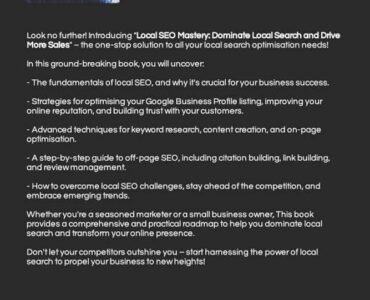Content clusters play a crucial role in modern SEO by grouping related content to strengthen website authority and boost organic traffic. These clusters help search engines understand the interconnectedness of content and improve the overall relevancy and quality of the website.
By organizing content into clusters around a central topic or pillar page, websites can enhance user experience and increase visibility in search results. This approach aligns with search engine algorithms that prioritize comprehensive and well-structured content. Embracing content clusters allows businesses to build a more authoritative online presence and drive higher engagement with their target audience.
As search engines continue to evolve, content clusters have become an essential strategy for achieving sustainable SEO success.

Credit: breaktheweb.agency
What Are Content Clusters?
In modern SEO, content clusters play a crucial role in enhancing website visibility and authority in search engine result pages. By organizing content into clusters, websites can establish topical authority, improve user experience, and boost their search engine ranking.
Introduction
Content clusters are a strategic approach to organizing and linking related content on a website. This content model helps search engines understand the topical relevance and authority of the website, providing a cohesive and comprehensive user experience. By creating a hub of interlinked content, websites can improve their SEO performance and user engagement.
Definition And Structure
Content clusters consist of a pillar page, which serves as the main hub of a specific topic, and related subtopic pages that delve deeper into specific aspects of the main topic. The pillar page provides a broad overview of the topic and links to the subtopic pages, forming a cohesive structure that demonstrates the website’s expertise in a particular subject area. This interconnected structure helps search engines understand the contextual relevance and depth of content on the website.
Importance In Modern Seo
Content clusters are crucial in modern SEO as they enable websites to build topical authority, enhance user experience, and improve search engine rankings. By organizing content into clusters, websites can signal their expertise in specific subject areas, which can positively impact their visibility and credibility in search results. Additionally, content clusters facilitate internal linking, which distributes link equity across related pages and enhances the overall SEO performance of the website.

Credit: blog.hubspot.com
Why Content Clusters Are Crucial For Seo
Content clusters have emerged as a game-changer in the world of modern SEO. They are a strategic approach that organizes content around a central topic, enabling search engines to understand the context and relevance of the content. This has a direct impact on search engine rankings, organic visibility, and user experience. Now let’s delve into the specific reasons why content clusters are crucial for SEO.
Enhanced User Experience
Content clusters contribute to an improved user experience by providing a seamless navigation path for visitors. When content is organized into clusters, users can easily navigate through related topics, finding comprehensive information without having to search extensively. This helps in reducing user bounce rates and increasing engagement, ultimately leading to a positive impact on SEO performance.
Improved Organic Visibility
By leveraging content clusters, websites can enhance their organic visibility. Search engines recognize the interconnectedness of content within clusters and reward websites with higher visibility in search results. When users search for information related to the central topic of a content cluster, the entire cluster has the potential to appear in the search results, increasing the chances of attracting organic traffic.
Higher Ranking Potential
Content clusters empower websites with higher ranking potential by signaling to search engines that they are authoritative sources on a particular topic. When a website becomes recognized for housing a comprehensive content cluster, it increases the likelihood of ranking prominently for related keywords and phrases. This is a key factor in driving organic traffic and establishing the website’s authority in its niche.
How To Create An Effective Content Cluster
Content clusters have become an essential aspect of modern SEO strategies. Their purpose is simple — to organize and structure the content on your website in a way that aligns with how search engines index and understand information. By implementing a content cluster strategy, you can boost your website’s visibility and authority, making it easier for search engines to recognize the relevance and value of your content. A well-executed content cluster strategy can lead to higher rankings, increased organic traffic, and improved user experience. In this article, we will delve into the process of creating an effective content cluster.
Topic Selection
When it comes to creating a content cluster, the first step is topic selection. It involves identifying a broad topic or theme that is relevant to your website and aligns with your target audience’s interests and needs. Choose a topic that allows you to cover various aspects or subtopics comprehensively. This would provide ample opportunities to create pillar content and supporting articles within the cluster.
Keyword Research
Keyword research is integral to the success of your content cluster. It involves identifying the keywords and phrases that your target audience is using to search for information related to your chosen topic. By conducting thorough keyword research, you can gain valuable insights into the search volume, competition, and relevancy of different keywords. Focus on long-tail keywords that have a good balance of search volume and relatively low competition. These keywords will serve as the foundation for your pillar content and supporting articles.
Creating Pillar Content
Pillar content is the cornerstone of your content cluster. It is a comprehensive and in-depth piece of content that covers the key aspects of your chosen topic. This content serves as the central hub or pillar, providing a comprehensive overview of the subject matter. When creating pillar content, aim for a word count of 2,000 words or more to ensure you cover the topic comprehensively. Use subheadings to break down the content into easily digestible sections, making it easier for both search engines and readers to navigate.
Developing Supporting Articles
Supporting articles are supplementary pieces of content that delve into specific subtopics or subcategories within your pillar content. These articles should link back to the pillar content, creating a strong internal linking structure that signals to search engines the interconnectedness and relevance of the content within the cluster. Aim for a word count of around 1,000 words for each supporting article. Include keyword variations and synonyms throughout the articles to leverage different search queries and increase the cluster’s visibility.
Best Practices For Optimizing Content Clusters
Content clusters are key for modern SEO as they help organize and interlink related content, increasing visibility and engagement. By grouping related topics together and providing comprehensive information, content clusters optimize search engine rankings, providing a more seamless user experience.
Optimizing content clusters is crucial for achieving a higher ranking on search engine result pages. By following best practices, you can enhance your website’s visibility, increase organic traffic, and create a seamless user experience. This section outlines the key strategies for optimizing content clusters, including internal linking strategies, optimizing meta data, using relevant keywords, and tracking performance. By implementing these practices, you can effectively boost your website’s SEO performance and drive more targeted traffic to your content.
Internal Linking Strategies
Internal linking is an essential component of optimizing content clusters. By strategically linking related pages within your website, you can help search engines understand the hierarchy and relevance of your content. This also allows users to navigate through your site easily and discover more valuable information. When implementing internal links, consider the following best practices:
- Link to relevant, related content within your website.
- Use descriptive anchor texts that accurately describe the linked content.
- Ensure that your internal links are contextually relevant to the page they appear on.
- Avoid overusing internal links, as it could dilute the authority of your content.
Optimizing Meta Data
Meta data plays a vital role in optimizing content clusters for SEO. These HTML elements provide information about your web pages to search engines, helping them understand your content better. To optimize your meta data effectively, keep the following tips in mind:
- Write compelling and concise meta titles that accurately reflect the content of the page.
- Create unique and engaging meta descriptions that entice users to click.
- Incorporate relevant keywords naturally into your meta tags.
- Ensure that each page’s meta data is unique and tailored to its specific content.
Using Relevant Keywords
Keywords are the foundation of every successful SEO strategy. When optimizing your content clusters, conducting thorough keyword research is crucial. Here are some best practices to follow:
- Identify relevant and high-performing keywords that align with your content and target audience.
- Incorporate these keywords organically throughout your content clusters, including titles, headings, and body text.
- Avoid overstuffing keywords, as this can negatively impact user experience and lead to penalties from search engines.
- Monitor and adapt your keyword strategy regularly to align with changing trends and user intent.
Tracking Performance
Tracking the performance of your content clusters is crucial for identifying areas of improvement and optimizing your SEO strategy. By monitoring key metrics and analyzing data, you can make informed decisions to enhance your website’s performance. Here are some essential performance tracking best practices:
- Use tools like Google Analytics to track organic traffic, bounce rates, and conversions for your content clusters.
- Analyze user engagement metrics, such as time on page and click-through rates, to understand how effectively your content is resonating with your audience.
- Regularly review and analyze your performance data to identify patterns, trends, and opportunities for optimization.
- Use A/B testing to experiment with different strategies and measure their impact on performance.
Case Studies: Successful Implementation Of Content Clusters
The effective use of content clusters has been proven to significantly improve search engine optimization (SEO) strategies by providing both users and search engines with valuable and organized content. Let’s delve into some industry examples and explore the benefits and results of implementing content clusters.
Industry Examples
Several industries have successfully implemented content clusters to enhance their online presence and boost organic traffic. Here are a few noteworthy examples:
| Industry | Website | Content Cluster Topic |
|---|---|---|
| Fitness | FitnessFreak.com | The Ultimate Guide to Weight Loss |
| Technology | TechGurus.com | The Future of Blockchain Technology |
| Travel | WanderlustAdventures.com | Exploring Paradise: A Guide to Tropical Destinations |
Benefits And Results
The successful implementation of content clusters has yielded numerous benefits and remarkable results for businesses. Let’s take a closer look at the advantages:
- Improved User Experience: Content clusters organize related information, making it easier for users to navigate and find the specific content they are searching for.
- Enhanced Search Engine Visibility: Search engines reward websites that structure their content in a cluster format, resulting in increased organic rankings and visibility.
- Targeted Keyword Optimization: Content clusters allow businesses to strategically target multiple related keywords, maximizing their chances of ranking for various search queries.
By implementing content clusters, businesses have observed remarkable results, including:
- Higher Organic Traffic: Websites that have incorporated content clusters have experienced a significant surge in organic traffic, driving more qualified leads and potential customers to their platforms.
- Reduced Bounce Rates: As content clusters provide comprehensive and relevant information, users tend to spend more time on websites, decreasing bounce rates and increasing engagement.
- Increased Conversion Rates: The targeted approach of content clusters ensures that users find the information they need, leading to improved conversion rates and a higher likelihood of achieving business goals.
These case studies highlight the immense value of content clusters in modern SEO practices. By implementing a well-structured content strategy, businesses can enjoy improved user experience, increased search engine visibility, and ultimately, substantial business growth.

Credit: breaktheweb.agency
Frequently Asked Questions Of The Role Of Content Clusters In Modern Seo
What Is Content Clusters In Seo?
Content clusters in SEO involve grouping related content around a central topic to boost search engine visibility. By linking related pieces, you establish authority and relevance, enhancing your site’s ranking potential. This strategic approach helps search engines understand your content’s context and can lead to higher organic traffic.
What Is The Role Of Content In Seo?
Quality content plays a crucial role in SEO by improving website visibility and attracting organic traffic. It helps to incorporate relevant keywords, engage users, and earn backlinks, signaling authority to search engines. Content also enhances user experience, reducing bounce rates and increasing dwell time, which are essential SEO factors.
What Is The Cluster Approach To Seo?
The cluster approach to SEO is a strategy where you create a pillar page around a broad topic and support it with related content clusters. It helps search engines understand the context of your content and improves your ranking for specific keywords.
Why Are Topic Clusters Important?
Topic clusters are important because they help organize content around a core topic and improve SEO. By grouping related articles together, search engines understand the context and relevance of the topic. This leads to higher search rankings, increased organic traffic, and better user experience.
Conclusion
Content clusters have become an essential part of modern SEO strategies. By organizing related content into clusters, websites can provide a better user experience and improve their search engine rankings. With a structured approach to content creation and internal linking, websites can enhance their authority and relevance in the eyes of search engines.
So, whether you’re a blogger, an online business owner, or an SEO professional, incorporating content clusters into your strategy can greatly benefit your online presence. Stay ahead of the competition and optimize your website with the power of content clusters.
Related Posts
Recent Posts
- Optimizing Images for SEO and Page Speed: Boost Your Website’s Performance!
- Seo for Local Businesses Step-By-Step Guide: Boost Your Online Success Today!
- The Role of Content Clusters in Modern SEO: Boost Your Rankings
- Supercharge Your SEO Success with High-Quality Backlinks
- Impact of User Experience on SEO Rankings: Boost Your Website’s Performance
Recent Comments
Archives
Categories
Categories
- Blog(40)
- Local SEO(1)
- On-Page SEO(1)
- SEO(7)
- SEO Optimization(1)





